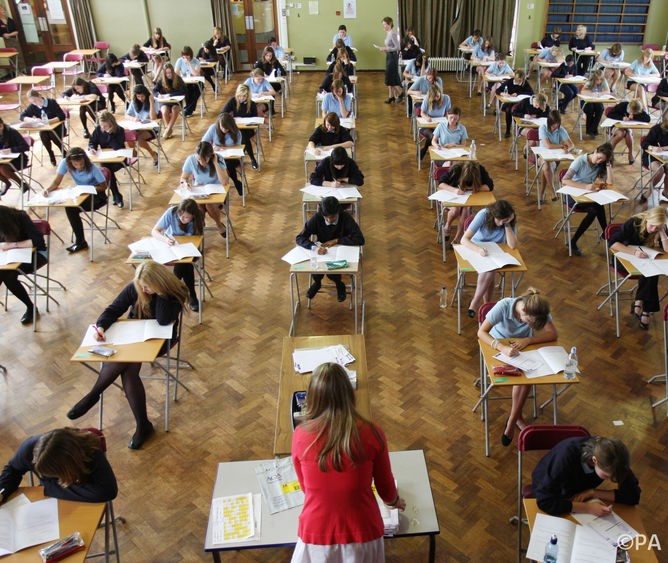By Gavin Mackintosh-
An ongoing debate within the realm of education has been reignited by a contentious computing paper, which sparked widespread complaints about its level of difficulty.
The examination, administered for the General Certificate of Secondary Education (GCSE), has prompted discussions surrounding the criteria for determining when an exam paper is deemed excessively challenging.
Teachers and pupils complained bitterly about the level of difficulty of the GCSE exam set in May. Kaajal Chohan, head of computing at a Leicester school, at the time tweeted that the paper was “awful” with pupils left “completely disheartened”.
Amidst these conversations, the examination board responsible for the paper, OCR, has acknowledged its elevated difficulty this year, leading to the adjustment of grade boundaries to accommodate the situation.
Following the release of the GCSE results last week, OCR provided insights into its evaluation process and subsequent decisions. The examination board confirmed that it had meticulously assessed the computing science paper, incorporating feedback from various stakeholders, while conducting a thorough analysis during the marking phase.
Consequently, OCR acknowledged that the paper had indeed proven to be “slightly more difficult,” necessitating a reevaluation of the grade boundaries to ensure fairness.
An insider anonymously told The Eye Of Media.Com: ” the paper was definitely too difficult for GCSE pupils, which is why even very bright students struggled with it. That is why grade boundaries for this particular paper was adjusted accordingly. This means the very high standard was taken into account in the grading of the exam”.
However, grade boundaries do limited favours for average or below average students who will often have no chance of passing exams that tough, even after grade boundaries are taken into account. This suggests that not everybody benefits fairly from grade boundaries”.
The controversy emerged in the wake of the May GCSE exams when school leaders and educators voiced their concerns about the computing science paper, after numerous high-achieving students experienced feelings of distress and demoralization due to the paper’s difficulty.
In response to these grievances, OCR announced that it would undertake a comprehensive review of the paper to evaluate its appropriateness and difficulty level.
Notably, computing science witnessed a notable decline in the number of grades 7 and above this year in comparison to 2022. However, this decline was anticipated due to the subject’s remarkable rise in top results when teacher-assigned grades were implemented during the COVID-19 pandemic.
Despite this decrease, the field of computing still demonstrated a remarkable 13 percent increase in top grades when compared to the year 2019 – an achievement that stood out as one of the highest among all popular subjects.
Delving into the specifics, grade boundaries unveiled by OCR showcased the requisites for achieving a grade 7 in computer science paper 2 for this year. Students needed to accumulate 49 out of a total of 80 marks, (61%)while for computer science paper 1, a score of 57 out of 80 marks was the threshold for the same grade.
For contextual comparison, students aiming for a grade 7 in 2019 had to achieve 56 out of 80 marks in paper 2 or 57 out of 80 marks in paper 1.(71%)
However, OCR emphasized the complexity of comparing the two years directly due to the introduction of a new GCSE specification, rendering this year’s paper a non-existent entity in 2019.
The critical evaluation of the paper’s difficulty began in earnest when teachers and students took to social media to express their reservations about the J277 GCSE (9-1) paper 2. Educators highlighted concerns about the paper containing excessive wording in questions, while the overall paper was described as a significant leap in difficulty compared to its predecessors.
OCR’s response at the time acknowledged that some students encountered challenges and pledged to assess the situation during the marking and awarding phases.
GCSE entries in computing have experienced a notable uptick of 13.2 percent across the United Kingdom over the past five years. In contrast, the overall increase in GCSE entries across all subjects stood at 6.4 percent during the same period, according to analysis conducted by Datalab.
However, while the field has shown growth, the level of difficulty has been a subject of scrutiny. Data from the same analysis demonstrated that 64.8 percent of computing pupils achieved grade 4 or higher in 2023, compared to 68.2 percent across all subjects.
The disparities in grading within the computing field have not gone unnoticed. The Chartered Institute for IT, also known as BCS, conducted prior analysis indicating that students generally achieve slightly lower grades in computing compared to other comparable GCSE subjects.
Further intensifying the scrutiny, the exam regulator Ofqual has previously announced its intent to review the standards within GCSE computer science, ensuring that the assessment aligns with appropriate academic rigor and fairness.
There are other subjects many pupils have similarly complained were too difficult, but not the extent of GCSE computers science.
Ofqual was contacted for comment




